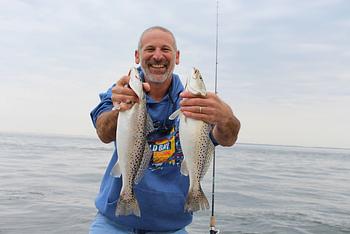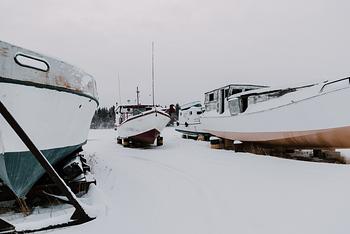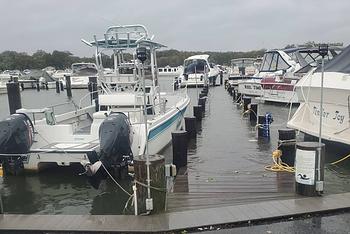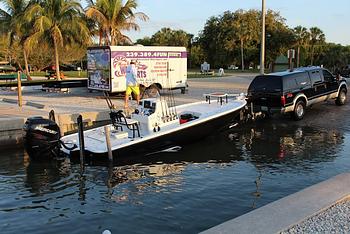Your job as captain of a boat is to keep the boat and everyone aboard safe. Hopefully you’ll never encounter a storm like our editor did, but it’s best to be prepared. Your ability to do so will depend on the full breadth of your skills and know-how, including your boat-handling and navigation capabilities, understanding the right-of-way rules, and your preparation for the many things that can happen on the water.
“My friend Beth and I were watching the radar all day on my weather app as we sailed across Massachusetts Bay and then westward down Buzzards Bay. While a series of yellow and green blotches brought rain as they overtook us, they brought no extra wind, so I was lulled into a sense of security. When the last one came through, we were taking pictures, because they were spectacular, when we should have been getting set to drop our sails! The wind gusted to 35 knots, causing damage to our mast/boom connection, but fortunately nothing serious broke. A year later, though, when a microburst with 45-knot gusts hit as we were sailing near Newport, Rhode Island, our decision to drop sails was immediate—and necessary. Several other nearby boats capsized.”
—John Burnham, Rightboat editor
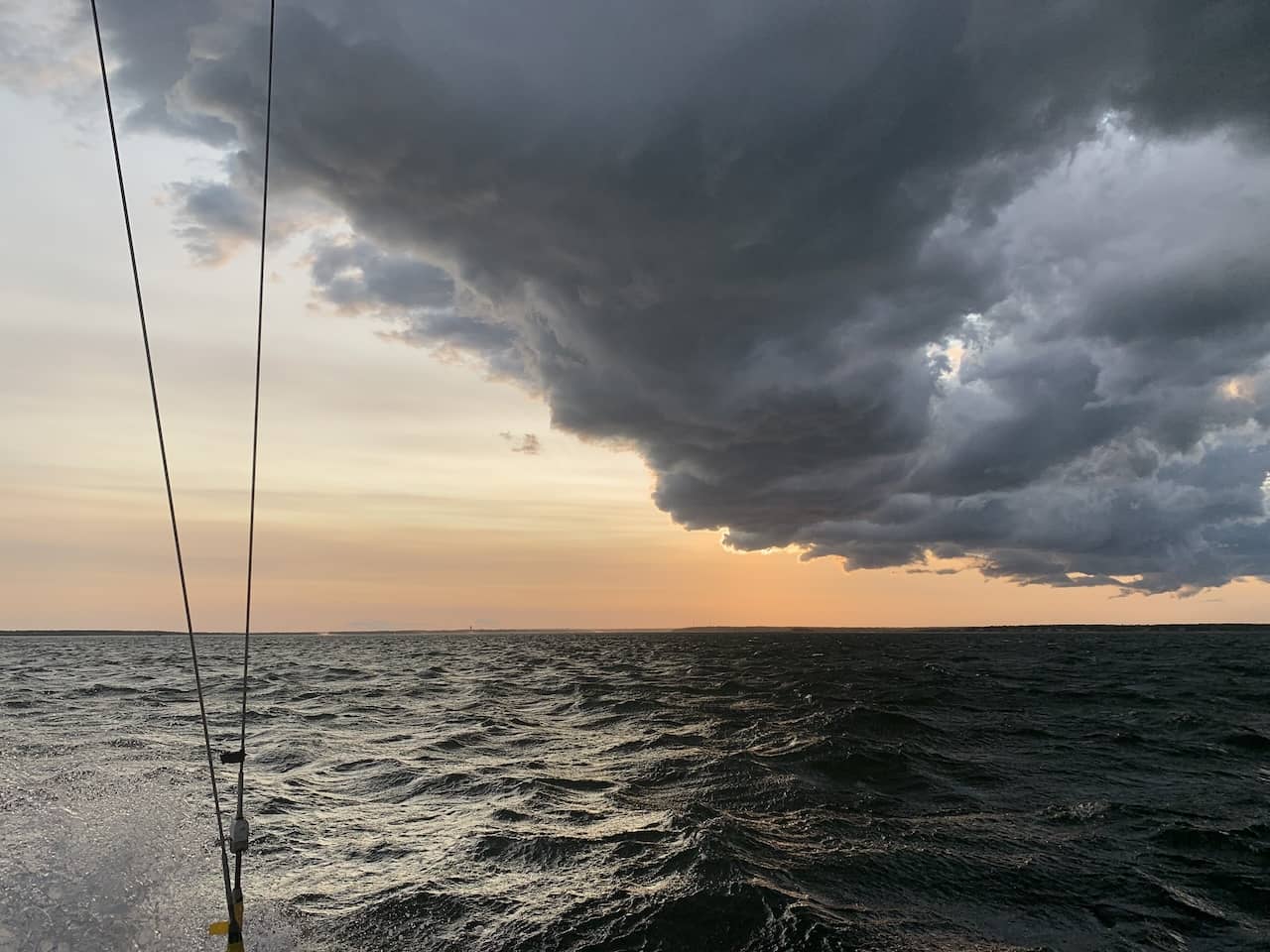
Sailing down Buzzards Bay, Massachusetts, as a squall of wind approaches. John Burnham photo.
Keeping boating safety tips in mind while preparing for your trip and while you are on the water will help you ensure that everyone returns to the docks safe and secure. Here is what you need to know about boat safety for every type of watercraft.
Before Your Trip
Complete a boating safety course
Taking a boating safety course is one of the best ways to learn boating safety tips quickly and effectively. These courses cover the basic boating and navigation rules all boaters need to know as well as any local laws for the bodies of water nearby. These courses are often free, can be completed in a day, and can be taken in person or online.
Many states require boat owners to take a boating safety course and pass it to earn a certificate. Some states also have specific licensing requirements and boating safety tips for kids who are younger than a specific age. If your state doesn't require you to take a boating safety course, take one anyway to ensure you know the rules.
Get extra training aboard your boat
People often hire a golf pro to improve their swing, and all they have to worry about is their score in that day’s game. Aboard a boat, there’s much more at stake every time you head out on the water—the well-being of your guests plus the boat itself. We recommend bringing a knowledgeable captain aboard to help you learn to handle your boat safely when maneuvering on crowded waterways or coming and going from your berth in the marina.
Instruction that makes your boating safer will vary from learning to handle the powerful engines on your boat, to launching and hauling your trailerable boat at the boat ramp, to setting and trimming the sails on your sailboat. Depending on where you do your boating, instruction can be found through local boating schools or the boat dealership that sold you your boat.

Have a certified professional check out your boat
Take advantage of the free vessel safety checks that the U.S. Coast Guard Auxiliary and U.S. Power Squadron make available at various locations before you take your boat out on the water. Their certified professional examiners will inspect the structure of the boat, its equipment, and its safety features to ensure everything is good to go. There are no penalties if the boat does not pass the inspection, and you will be made aware of any issues that you need to address.
Give your float plan to a trusted individual
A float plan is an outline of your specific boating trip—where you intend to go, when you plan to return—that is provided to someone on land to use in the event of an emergency. If you do not return when expected, this person can notify the proper authorities and get a search started. Your float plan should include the names of the people on the boat with addresses and phone numbers, along with boat identifying information, where you plan to go, and when you plan to return.
Basic Boating Safety Tips
There is not much difference between offshore and inland-lake safety tips because nearly any type of boating situation can happen on nearly any body of water. The trick is to be prepared for anything that happens. Here are some of the best boating safety tips that you can use on any body of water.
- Follow the local rules and laws of the waterway closely.
- Be observant, and continuously scan the water around you for hazards, anchored boats with diving flags, and navigational aids.
- Keep a safe distance from other boats, swimmers, and the shore.
- Operate at a safe speed and steer clear of large boats that cannot quickly stop or turn.
- Don't drink alcohol while operating a boat. Boating under the influence of alcohol (BUI) is illegal in all 50 states.
- Don't load your boat past its legal capacity. Loading over capacity can unbalance the boat and increase its chances of swamping or capsizing.

Severe Weather Boating Safety
The weather can change quickly while you're on the water, and you may have to make quick decisions to ensure your passengers' safety.
- Check the weather forecast before you head out. Use VHF marine radios, phone apps, commercial radio stations, television stations, and/or newspapers to get information on the local weather.
- Keep an eye —and an ear—out for changing weather conditions while on the water. National and local weather stations will broadcast storm warnings over the radio.
- Head in when you see a storm. It may be more powerful than you expect.
- Be aware of sudden temperature drops or varying gusts of wind. These signs could indicate that a storm is approaching.
- Be prepared for hot or cool weather. Dress properly and bring extra layers of clothing. Make sure you bring (and wear) sunscreen, plenty of drinking water, plus extra clothes in case anyone gets wet.
Essential Boat Safety Gear
Having the proper gear on board is also essential for proper boat safety. Here are the safety items that every boat should have aboard before leaving the dock.
- Properly-sizedlife jackets for everyone on board
- A radio for monitoring weather alerts
- A throwable flotation device—a requirement for boats longer than 16 feet (4.8 meters)
- A flashlight and extra batteries
- A bucket for bailing out water
- A waterproof whistle for signaling for help
- A mirror or other reflective surface for signaling with sunlight
- Ropes for tying off or pulling someone out of the water
- Flares and a fire extinguisher
- A first-aid kit containing adhesive and gauze bandages, scissors, tweezers, fabric tape, burn cream, antiseptic ointment, saline solution with a nozzle tip, individually wrapped common medicines, alcohol wipes, disposable gloves, and an instant cold pack
- A tool kit containing multi-tool, screwdrivers, wrenches, and sockets, a telescoping mirror and magnet, cable ties, thread-locking fluid, jumper cables, a rigging knife, and spare bulbs, fuses and belts
- Duct tape for securing items and making temporary repairs
- Garbage bags to shield people and equipment from rain
This article was published in May 2023 and updated in May 2024.

